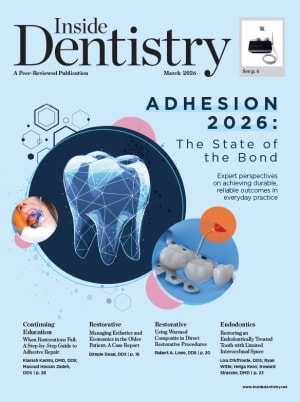Revisiting Antibiotic Stewardship
The COVID-19 pandemic significantly disrupted all facets of dentistry. In March 2020, little was known about its transmission, both generally and within the dental office. This, coupled with a nationwide shortage of personal protective equipment (PPE), led to the recommendation to postpone all elective dental care and to treat only the most severe emergencies. In addition, the US Centers for Disease Control and Prevention encouraged practitioners to provide care via teledentistry, when possible, rather than providing in-person care. This raised concerns among clinicians and academics alike about the risk of antibiotic overprescription, and these worries were far from unfounded. Early data from the United Kingdom indicated a 25% increase in antibiotic prescriptions from April 2020 to July 2020 when compared with the same months in 2019.
Given the documented increase in antibiotic prescriptions that directly resulted from the office closures during the COVID-19 pandemic, it is apparent that some clinicians need to improve their understanding of antibiotic stewardship. Stewardship is about managing antibiotics so that they are only used when they are necessary. For clinicians, this entails following evidence-based prescribing protocols that limit the use of antibiotics to only those infections that warrant their delivery. Even when properly prescribed, antibiotics are associated with morbidity and mortality at individual and population-based levels. The risks associated with antibiotic use include adverse effects, such as gastrointestinal upset, photosensitivity, and allergic reactions; superinfections caused by the overgrowth of certain organisms, such as Candida albicansand Clostridium difficile; and antimicrobial resistance. The development of antimicrobial resistance is well-documented in both medical and dental settings. Being a good steward of antibiotics as a resource serves to both minimize the negative outcomes associated with their use as well as preserve their decreasing utility secondary to resistance.
Because antibiotics are only adjunctive in the treatment of dental infections, definitive care for the infection, namely extraction or endodontic treatment, should be delivered expediently. With that said, clinical situations do arise in which antibiotic therapy is beneficial. The indications for adjunctive antibiotics include infections with concomitant signs of systemic involvement that are characterized by fever, malaise, lymphadenopathy, or trismus as well as infections in medically compromised patients, including those with uncontrolled diabetes and those utilizing immunosuppressive medication, among others. Rapidly progressing infections, including those that manifest within 24 hours, cellulitis, or those that are otherwise spreading, and cases of osteomyelitis should also receive antibiotic therapy. In addition, when managing dental trauma associated with avulsions or major soft-tissue injuries, the prescription of antibiotics is advisable. Although antibiotics are indicated when definitive care cannot be immediately delivered, their necessity in these situations should be carefully evaluated. A final indication for antibiotic therapy is premedication for patients who fall under the American Heart Association's guidelines for antibiotic prophylaxis, patients with prosthetic joints for whom antibiotic prophylaxis is recommended by their orthopedic surgeon, and other medically compromised patients for whom antibiotic prophylaxis is recommended by their physician.
Several contraindications for antibiotic therapy exist. Chronic infections or acute infections that remain localized do not require antibiotic therapy. These include chronic apical abscesses with sinus tracts or acute apical abscesses with limited, localized swelling. In addition, cases of symptomatic irreversible pulpitis in which the symptoms originate from an inflamed pulp but are not associated with infection do not require antibiotics, and cases involving pulpal necrosis and periradicular disease, including symptomatic and asymptomatic apical periodontitis, also do not require antibiotic prescription. Lastly, systemic antibiotics are not indicated in cases involving minor traumatic injuries, including fractures and luxation injuries.
To combat the global risk of increasing antimicrobial resistance, it is essential for dental healthcare professionals to be good stewards of antibiotics, particularly amid the COVID-19 pandemic. In order to preserve their utility for years to come, clinicians must adhere to evidence-based prescribing protocols. We vow to "do no harm," and antibiotic stewardship falls under this mandate.
About the Author
Rebekah Lucier Pryles, DMD, is a diplomate of the American Board of Endodontics, an assistant clinical professor at the Tufts University School of Dental Medicine, and a clinical instructor at the Harvard School of Dental Medicine. She maintains a private practice in White River Junction, Vermont.
